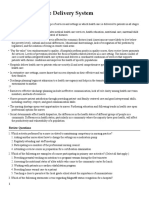0 ratings0% found this document useful (0 votes)
1K viewsPQCNC New Initiative Proposal Rescuing Moms and Babies From Maternal Substance Use
PQCNC New Initiative Proposal Rescuing Moms and Babies From Maternal Substance Use
Uploaded by
kcochranPerinatal Quality Collaborative of North Carolina New Initiative Proposal - Rescuing Moms and Babies from Maternal Substance Use Disorders
Copyright:
© All Rights Reserved
Available Formats
Download as PDF, TXT or read online from Scribd
PQCNC New Initiative Proposal Rescuing Moms and Babies From Maternal Substance Use
PQCNC New Initiative Proposal Rescuing Moms and Babies From Maternal Substance Use
Uploaded by
kcochran0 ratings0% found this document useful (0 votes)
1K views8 pagesPerinatal Quality Collaborative of North Carolina New Initiative Proposal - Rescuing Moms and Babies from Maternal Substance Use Disorders
Copyright
© © All Rights Reserved
Available Formats
PDF, TXT or read online from Scribd
Share this document
Did you find this document useful?
Is this content inappropriate?
Perinatal Quality Collaborative of North Carolina New Initiative Proposal - Rescuing Moms and Babies from Maternal Substance Use Disorders
Copyright:
© All Rights Reserved
Available Formats
Download as PDF, TXT or read online from Scribd
Download as pdf or txt
0 ratings0% found this document useful (0 votes)
1K views8 pagesPQCNC New Initiative Proposal Rescuing Moms and Babies From Maternal Substance Use
PQCNC New Initiative Proposal Rescuing Moms and Babies From Maternal Substance Use
Uploaded by
kcochranPerinatal Quality Collaborative of North Carolina New Initiative Proposal - Rescuing Moms and Babies from Maternal Substance Use Disorders
Copyright:
© All Rights Reserved
Available Formats
Download as PDF, TXT or read online from Scribd
Download as pdf or txt
You are on page 1of 8
Rescuing Moms and Babies from
Maternal Substance Use Disorders
Marty McCaffrey, MD, CAPT USN (Ret)
UNC School of Medicine
Background
• Maternal substance use disorder and infant drug
withdrawal or neonatal abstinence syndrome (NAS) are
at epidemic proportions in North Carolina and play an
increasingly significant role in maternal and infant
morbidity and mortality.
• NAS rates have risen approximately 300% in North
Carolina over the last 5 years. NAS management
demonstrates dramatic variations in care leading to
extended hospital stays with significant social, medical
and fiscal impacts. The transition to home for these
mothers and their infants is also a very vulnerable
period which requires significant support.
Aim
• Create a model of support for the care of mothers with substance
abuse disorder and their infants that includes the antepartum
period, delivery, birth hospitalization of mother and baby, but
extends beyond discharge for six months.
• Pair a small hospital and its referral center in a regional area.
• Focus on building a system of support for optimal health outcomes
in situations of maternal substance use via best practices, peer
support, and regular contact with maternal child social workers
specifically trained in trauma cognitive behavioral therapy.
• Improve compliance of mothers with substance use disorders with
rehabilitation, reduce custody actions by CPS, improve compliance
with well child checks and immunizations, reduce hospital
readmissions, and reduce length of stay for infants with NAS.
• This proposal could be piloted in two regions initially with a plan to
spread (based on funding, support, collaboration) in 1or 2
subsequent phases.
Reach
• The pilot would serve four hospitals in two
perinatal regions in the state initially.
• These facilities could be identified based on
need (severity of the substance use epidemic)
and hospital willingness to participate.
• The model developed will be one that can be
deployed statewide.
Proposed Methods
• Include all key elements of the AIM Bundle for Maternal Opioid Use…and
more…of course.
• PQCNC develops a web based data warehouse to support submission of
hospital data related to key metrics that will include maternal and
pediatric measures.
• PQCNC partners with Horizons Program staff, CC4C, DMA, DPH and other
state agencies engaged in providing support to mothers and babies in the
selected regions. These meetings will identify resources currently available
for families and seek opportunities to augment services which may exist.
• Specific metrics and targets might include maternal compliance with
rehabilitation, maternal stress levels, completing well child visits,
readmissions to the hospital, CPS custodial actions and LOS for the initial
NAS hospitalization.
• Partner with CC4C to analyze baseline data in the identified regions for a
number of pediatric related metrics. We will partner with other identified
agencies (DMA, BCBSNC, DPH, State Center for Health Statistics and
others) to collect baseline data related to maternal substance abuse.
Proposed Methods
• Identify and hire a maternal substance use disorder peer support
counselor (1.0 FTE) and a licensed maternal child social worker
trained in cognitive behavioral therapy (1.0 FTE) for each region.
• A total of 4 personnel will be hired to support the care in these 2
regions. These individuals will initiate contact with mother before
hospitalization, or both mom and baby during the birth
hospitalization.
• They will continue this support with every other week peer support
visits and monthly social worker visits.
• A psychologist with certification in training for trauma cognitive
behavioral therapy training for the licensed maternal child social
workers will be contracted as a 0.2 FTE. The supervisor will be
available to train and provide support to peer support and social
work staff in the two regions.
Impact
• Improve maternal adherence to rehab plans
• Improve the bonding experience in the hospital
• Improve breastfeeding rates
• Reduce need for pharmacologic therapy in infants
• Reduce hospital LOS for baby after birth
• Improve compliance with rehab post delivery
• Improve pediatric well child care compliance
• Reduce infant readmission rates
• Reduce CPS actions with families
Supporting Materials
• PQCNC has experience with its prior NAS
initiative
• AIM Bundle for women with opioid use
disorder
https://safehealthcareforeverywoman.org/pat
ient-safety-bundles/obstetric-care-for-women-
with-opioid-use-disorder/
You might also like
- PQCNC AIM RPC Spinning BabiesDocument71 pagesPQCNC AIM RPC Spinning Babieskcochran50% (2)
- Tab 19 - Visitation Observation ChecklistDocument2 pagesTab 19 - Visitation Observation ChecklistMFNo ratings yet
- Midwifery CurriculumDocument112 pagesMidwifery Curriculumsolomon john100% (1)
- PQCNC 2024 Initiative - Maternal SepsisDocument12 pagesPQCNC 2024 Initiative - Maternal SepsiskcochranNo ratings yet
- PQCNC NAS Phase 2 CharterDocument2 pagesPQCNC NAS Phase 2 CharterkcochranNo ratings yet
- PQCNC 2023 ClOUDi Continuation 2.0Document12 pagesPQCNC 2023 ClOUDi Continuation 2.0kcochranNo ratings yet
- Session 2 TrendsDocument25 pagesSession 2 TrendsEsraa AhmedNo ratings yet
- PQCNC PMH Screening Referral To TreatmentDocument11 pagesPQCNC PMH Screening Referral To TreatmentkcochranNo ratings yet
- Community Midwifery 2-1Document39 pagesCommunity Midwifery 2-1Chika JonesNo ratings yet
- Family Welfare ServicesDocument20 pagesFamily Welfare Servicesbemina ja100% (2)
- Medical Necessity Guidelines: Behavioral Health Evidence-Based Practices (EBP)Document5 pagesMedical Necessity Guidelines: Behavioral Health Evidence-Based Practices (EBP)Carol Golden GuidryNo ratings yet
- Family PlanningDocument15 pagesFamily PlanningSiwani BarmaNo ratings yet
- NCM 109N: Frameworks For Maternal & Child Health NursingDocument37 pagesNCM 109N: Frameworks For Maternal & Child Health NursingZudota100% (1)
- Trends in The ObstetricsDocument12 pagesTrends in The ObstetricssuthaNo ratings yet
- Changing Trends in Pediatrics and Pediatric NursingDocument18 pagesChanging Trends in Pediatrics and Pediatric NursingSakshi AsthanaNo ratings yet
- Report OB WardDocument60 pagesReport OB WarddummylouuNo ratings yet
- Framework For Maternal and Child Health NursingDocument64 pagesFramework For Maternal and Child Health NursingmarilexdomagsangNo ratings yet
- Family PlanningDocument4 pagesFamily Planningfayetish100% (2)
- Final Group Project Revision VersionDocument16 pagesFinal Group Project Revision Versionapi-217735356No ratings yet
- MCH SERVICES (Autosaved)Document18 pagesMCH SERVICES (Autosaved)kibetjavan15No ratings yet
- RCH ScribdDocument18 pagesRCH Scribdyomama23319No ratings yet
- SOP For Management of Un-Suppressed OVC BeneficariesDocument16 pagesSOP For Management of Un-Suppressed OVC BeneficariesasawaternguNo ratings yet
- BreastfeedingDocument9 pagesBreastfeedingapi-282602935No ratings yet
- NCM 107 - MCN I Michelle E. Flores, RN ManDocument62 pagesNCM 107 - MCN I Michelle E. Flores, RN ManAko Si Christian100% (2)
- Exploring The Business Case For Children's Telebehavioral HealthDocument6 pagesExploring The Business Case For Children's Telebehavioral HealthThe Institute for Innovation & ImplementationNo ratings yet
- Role of Nurse in FWPDocument14 pagesRole of Nurse in FWPDeepti Kukreti100% (1)
- MPH Research Proposal PaperDocument5 pagesMPH Research Proposal PapernonoNo ratings yet
- Module 1 NCM 107 NewDocument44 pagesModule 1 NCM 107 NewAmethyst100% (2)
- A Protocol Systematic Review of Birth PreparednessDocument8 pagesA Protocol Systematic Review of Birth PreparednessAisyah RobaniNo ratings yet
- Pediatrics Nursing UnitDocument43 pagesPediatrics Nursing UnitShweta SainiNo ratings yet
- Conceptual Framework For Hospitals, in PICU (Pediatric Intensive Care Unit)Document4 pagesConceptual Framework For Hospitals, in PICU (Pediatric Intensive Care Unit)Armstrong AsenaviNo ratings yet
- HP Pre-Reading #1Document39 pagesHP Pre-Reading #1Maria ClaraNo ratings yet
- Family Health 2Document42 pagesFamily Health 2coosa liquorsNo ratings yet
- Philippine Team: Fay de Ocampo Francine Bofill Daisy PanagsaganDocument17 pagesPhilippine Team: Fay de Ocampo Francine Bofill Daisy PanagsaganMelina Defita SariNo ratings yet
- Thesis Protocol: Dr. NikitaDocument17 pagesThesis Protocol: Dr. Nikitarajendra panwarNo ratings yet
- PQCNC Neonatal Abstinence Syndrome CharterDocument1 pagePQCNC Neonatal Abstinence Syndrome CharterkcochranNo ratings yet
- Care of Mother, Child, and Adolescent: Prepared by Donna Belle Sumugat RN ManDocument26 pagesCare of Mother, Child, and Adolescent: Prepared by Donna Belle Sumugat RN ManLaurence Docog100% (1)
- FHN MODULE1 PART 2 OVERVIEW of COMMUNITY HEALTH NURSING 1Document8 pagesFHN MODULE1 PART 2 OVERVIEW of COMMUNITY HEALTH NURSING 1ALYSSA MASACAYANNo ratings yet
- What Are Some Supports and Resources Teenage Parents Need Other Than Educational Services?Document1 pageWhat Are Some Supports and Resources Teenage Parents Need Other Than Educational Services?Šåräh PęrśåüdNo ratings yet
- PQCNC New Initiative Proposal HypoglycemiaDocument8 pagesPQCNC New Initiative Proposal HypoglycemiakcochranNo ratings yet
- The Health Care Delivery SystemDocument14 pagesThe Health Care Delivery SystemDolma Tamang100% (1)
- Aol'S Wellbaby Program: An Employer Case StudyDocument8 pagesAol'S Wellbaby Program: An Employer Case StudyAshish NemaNo ratings yet
- Published ProtocolDocument15 pagesPublished ProtocolJabeto SierraNo ratings yet
- Efficacy of Therapist Supported Interventions From The NeonatalDocument22 pagesEfficacy of Therapist Supported Interventions From The NeonatalRonald MHNo ratings yet
- Hospital Breastfeeding Toolkit - IllinoisDocument70 pagesHospital Breastfeeding Toolkit - IllinoisRoiAnn Phillips100% (2)
- Familywelfareservices 190329102006Document26 pagesFamilywelfareservices 190329102006karunamightymech306No ratings yet
- Future DirectionsDocument2 pagesFuture Directionsgracebally06No ratings yet
- Imnci StrategiesDocument21 pagesImnci Strategiesshahaman1948No ratings yet
- SACP Recommendations LM 11 14 14 FINALDocument11 pagesSACP Recommendations LM 11 14 14 FINALBen SpragueNo ratings yet
- Arcadio - Newborn ScreeningDocument63 pagesArcadio - Newborn ScreeningkoalaNo ratings yet
- Family Nursing Process Week 4Document35 pagesFamily Nursing Process Week 4lithasyamadlyNo ratings yet
- Amarga Policy PaperDocument93 pagesAmarga Policy PaperAngel GarciaNo ratings yet
- Unit SixDocument21 pagesUnit SixRenad Q.No ratings yet
- Standards For Competence For Registered MidwivesDocument14 pagesStandards For Competence For Registered MidwivescarNo ratings yet
- Assessment of Maternal ConcernDocument5 pagesAssessment of Maternal Concernd28900835No ratings yet
- 7589 23863 1 SMDocument2 pages7589 23863 1 SMNYONGKERNo ratings yet
- Federal Register / Vol. 79, No. 200 / Thursday, October 16, 2014 / NoticesDocument2 pagesFederal Register / Vol. 79, No. 200 / Thursday, October 16, 2014 / NoticesAnonymous wUtTgUNo ratings yet
- Care - of - Mother - Child - and - Adolescent 2Document48 pagesCare - of - Mother - Child - and - Adolescent 2Jmarie Brillantes PopiocoNo ratings yet
- Template Research Group ADocument31 pagesTemplate Research Group ANik Rose ElNo ratings yet
- PE0019Document4 pagesPE0019Navila PurbaNo ratings yet
- Meeting the Needs of Older Adults with Serious Illness: Challenges and Opportunities in the Age of Health Care ReformFrom EverandMeeting the Needs of Older Adults with Serious Illness: Challenges and Opportunities in the Age of Health Care ReformAmy S. KelleyNo ratings yet
- PQCNC Birth Trauma Eliminating Disparities and Improving Equity in CareDocument12 pagesPQCNC Birth Trauma Eliminating Disparities and Improving Equity in CarekcochranNo ratings yet
- PQCNC 2024 Kickoff OB Sepsis Statewide Implementation 20240116Document33 pagesPQCNC 2024 Kickoff OB Sepsis Statewide Implementation 20240116kcochranNo ratings yet
- PQCNC Optimizing Newborn Screening in North CarolinaDocument10 pagesPQCNC Optimizing Newborn Screening in North CarolinakcochranNo ratings yet
- PQCNC 2024 Kickoff Long Story Short 20240110Document26 pagesPQCNC 2024 Kickoff Long Story Short 20240110kcochranNo ratings yet
- PQCNC 2024 Initiative Maternal CardiacDocument30 pagesPQCNC 2024 Initiative Maternal CardiackcochranNo ratings yet
- PQCNC clOUDi Kickoff Data 2021Document13 pagesPQCNC clOUDi Kickoff Data 2021kcochranNo ratings yet
- PQCNC 2024 Initiative Care of The Late Preterm InfantDocument9 pagesPQCNC 2024 Initiative Care of The Late Preterm InfantkcochranNo ratings yet
- PQCNC 2023 Standardizing The Care of Late-Preterm InfantsDocument17 pagesPQCNC 2023 Standardizing The Care of Late-Preterm InfantskcochranNo ratings yet
- PQCNC clOUDi LS2 OUD Pregnancy RyanDocument53 pagesPQCNC clOUDi LS2 OUD Pregnancy RyankcochranNo ratings yet
- PQCNC 2023 Maternal Toxin ExposureDocument12 pagesPQCNC 2023 Maternal Toxin ExposurekcochranNo ratings yet
- PQCNC 2023 Safe SleepDocument13 pagesPQCNC 2023 Safe SleepkcochranNo ratings yet
- PQCNC 2023 Enhancing Perinatal Mental HealthDocument10 pagesPQCNC 2023 Enhancing Perinatal Mental HealthkcochranNo ratings yet
- PQCNC NHPC LS3 Noel 2020 Workload Indicators 20200310.Document23 pagesPQCNC NHPC LS3 Noel 2020 Workload Indicators 20200310.kcochranNo ratings yet
- PQCNC NHPC LS3 Vidant Panel 20200310Document4 pagesPQCNC NHPC LS3 Vidant Panel 20200310kcochranNo ratings yet
- PQCNC 2023 Supporting The Diagnosis and Treatment of Severe HTNDocument11 pagesPQCNC 2023 Supporting The Diagnosis and Treatment of Severe HTNkcochranNo ratings yet
- PQCNC 2023 Improving The Use of Mother's Milk at DischargeDocument8 pagesPQCNC 2023 Improving The Use of Mother's Milk at DischargekcochranNo ratings yet
- PQCNC 2023 Recreational ToxinsDocument17 pagesPQCNC 2023 Recreational ToxinskcochranNo ratings yet
- PQCNC 2023 Nutrition in PregnancyDocument12 pagesPQCNC 2023 Nutrition in PregnancykcochranNo ratings yet
- PQCNC NHPC LS3 NHRMC Acuity Presentation 20200310Document14 pagesPQCNC NHPC LS3 NHRMC Acuity Presentation 20200310kcochranNo ratings yet
- PQCNC clOUDi Kickoff Main 2021Document27 pagesPQCNC clOUDi Kickoff Main 2021kcochranNo ratings yet
- North Carolina Perinatal Quality Collaborative Initiative: Standardizing Perinatal Substance Use ScreeningDocument41 pagesNorth Carolina Perinatal Quality Collaborative Initiative: Standardizing Perinatal Substance Use ScreeningkcochranNo ratings yet
- PQCNC AIM RPC LS3 Data 20200303Document16 pagesPQCNC AIM RPC LS3 Data 20200303kcochranNo ratings yet
- PQCNC AIM RPC LS3 Ketner Posting 20200303Document41 pagesPQCNC AIM RPC LS3 Ketner Posting 20200303kcochranNo ratings yet
- PQCNC NHPC LS3 Devente 20200310Document8 pagesPQCNC NHPC LS3 Devente 20200310kcochranNo ratings yet
- PQCNC BCII LS Evolution of The Birth CertificateDocument30 pagesPQCNC BCII LS Evolution of The Birth CertificatekcochranNo ratings yet
- PQCNC AIM RPC LS2 Volunteer Doula ProgramDocument23 pagesPQCNC AIM RPC LS2 Volunteer Doula ProgramkcochranNo ratings yet
- PQCNC AIM RPC LS2 Scheduling To Improve Labor SupportDocument20 pagesPQCNC AIM RPC LS2 Scheduling To Improve Labor SupportkcochranNo ratings yet
- Human Balance SystemDocument5 pagesHuman Balance SystemHendri SaputraNo ratings yet
- GriefDocument4 pagesGriefapi-83101465No ratings yet
- Angulo Daughter of Queen of ShebaDocument6 pagesAngulo Daughter of Queen of Shebaapi-406215102No ratings yet
- RestraintsDocument48 pagesRestraintsLeena Pravil100% (1)
- Digilaser 203: Electrotherapy ProductsDocument9 pagesDigilaser 203: Electrotherapy ProductsMintflex PhysiotherapyNo ratings yet
- 10 Simple Solutions To Worry Gyoerkoe en 10802Document5 pages10 Simple Solutions To Worry Gyoerkoe en 10802talalNo ratings yet
- What Is Energy PsychologyDocument17 pagesWhat Is Energy PsychologySatinder Bhalla100% (1)
- CSF Leak Association InfographicDocument1 pageCSF Leak Association InfographicLynzy B CoxNo ratings yet
- Frozen Shoulder PDFDocument264 pagesFrozen Shoulder PDFFebryLasantiNo ratings yet
- The Man Who Invented Qigong-1Document6 pagesThe Man Who Invented Qigong-1Jorge MeritanoNo ratings yet
- Carmelli Mariae H. Calugay 8-23-13 BSN-2Document1 pageCarmelli Mariae H. Calugay 8-23-13 BSN-2Carmelli Mariae CalugayNo ratings yet
- Pricelist PT. Vin Jatmika Abadi BMHP Axeell (E-Katalog)Document2 pagesPricelist PT. Vin Jatmika Abadi BMHP Axeell (E-Katalog)Ikhsan FakhurroziNo ratings yet
- Pelvic Floor Exercises BookletDocument24 pagesPelvic Floor Exercises Bookletdohnz2000100% (1)
- NCP For Ulnar SurgeryDocument5 pagesNCP For Ulnar SurgeryjiloNo ratings yet
- Which UTI Therapies Are Safe and Effective During Breastfeeding?Document3 pagesWhich UTI Therapies Are Safe and Effective During Breastfeeding?Naila Shofwati PutriNo ratings yet
- Fundamentals of Nursing - by Darius CandelarioDocument332 pagesFundamentals of Nursing - by Darius CandelarioEmman RamosNo ratings yet
- Criteria Excellent Good Fair Poor Very Poor Justification: PrognosisDocument2 pagesCriteria Excellent Good Fair Poor Very Poor Justification: PrognosisSheila Mae PanisNo ratings yet
- JBI Critical Appraisal-Checklist For Case Reports2017Document5 pagesJBI Critical Appraisal-Checklist For Case Reports2017AriaDanurdoroNo ratings yet
- ManjisthaDocument2 pagesManjisthaporurNo ratings yet
- PublicationsDocument9 pagesPublicationsCarlos RNo ratings yet
- HGFVXDocument10 pagesHGFVXRavish MalhotraNo ratings yet
- Myelination in Pediatric NeurologyDocument41 pagesMyelination in Pediatric NeurologyAna Bărdaș-ZugravuNo ratings yet
- Mmas4 Dan Mmas8 PDFDocument1 pageMmas4 Dan Mmas8 PDFMilly Farisa KurniaNo ratings yet
- Biological Theories of AgingDocument33 pagesBiological Theories of AgingRabia100% (2)
- By:Nelson P. Tagab/Zenaida Z. ZagadoDocument68 pagesBy:Nelson P. Tagab/Zenaida Z. ZagadoSimham VenuNo ratings yet
- Energy HealingDocument2 pagesEnergy HealingAmlan MishraNo ratings yet
- Critical Thinking in Respiratory Care Practice PDFDocument17 pagesCritical Thinking in Respiratory Care Practice PDFFernando MorenoNo ratings yet
- Management of Chronic Hepatitis CDocument14 pagesManagement of Chronic Hepatitis CAnonymous fPzAvFLNo ratings yet
- Acr Practice Parameter For The Performance of Fluoroscopic Contrast Enema Examination in AdultsDocument8 pagesAcr Practice Parameter For The Performance of Fluoroscopic Contrast Enema Examination in AdultsHercules RianiNo ratings yet






















































































































